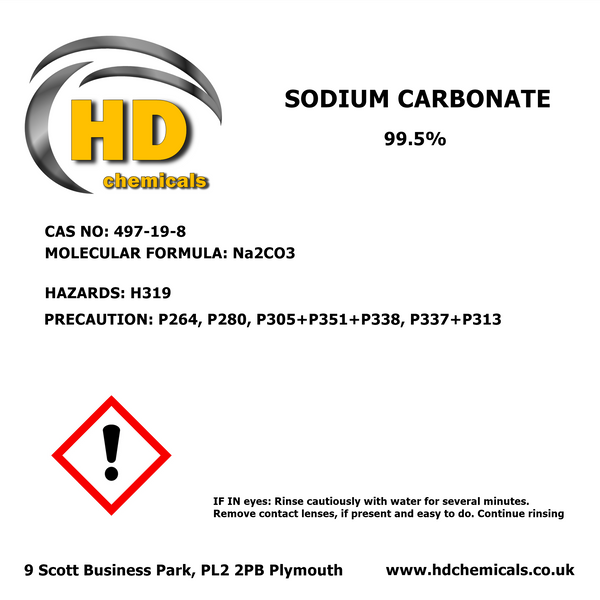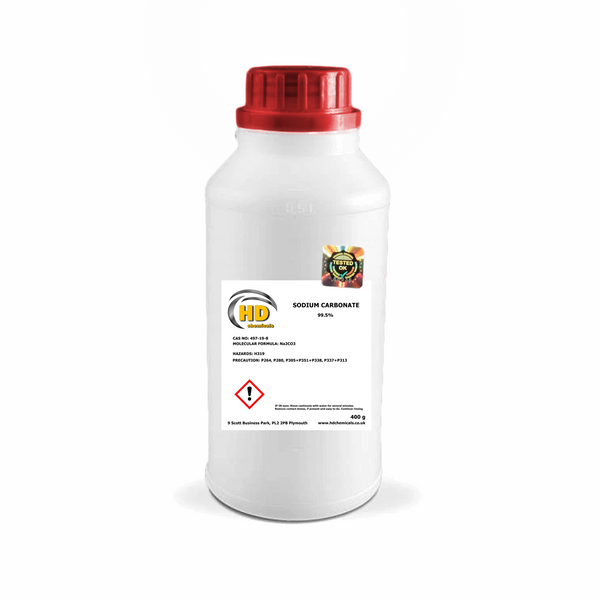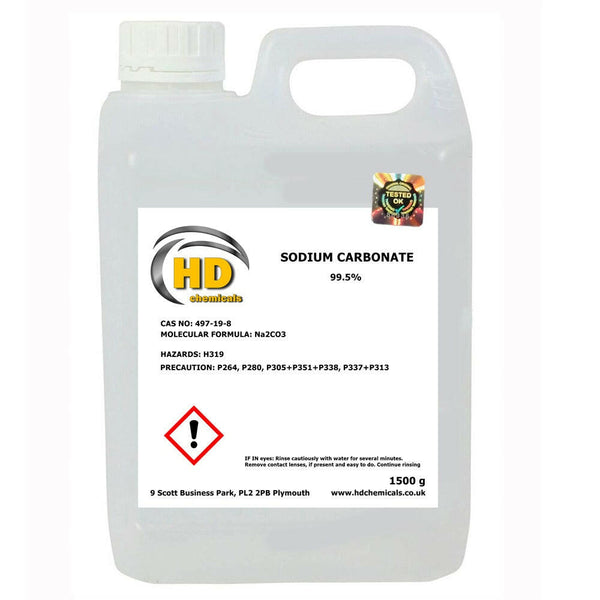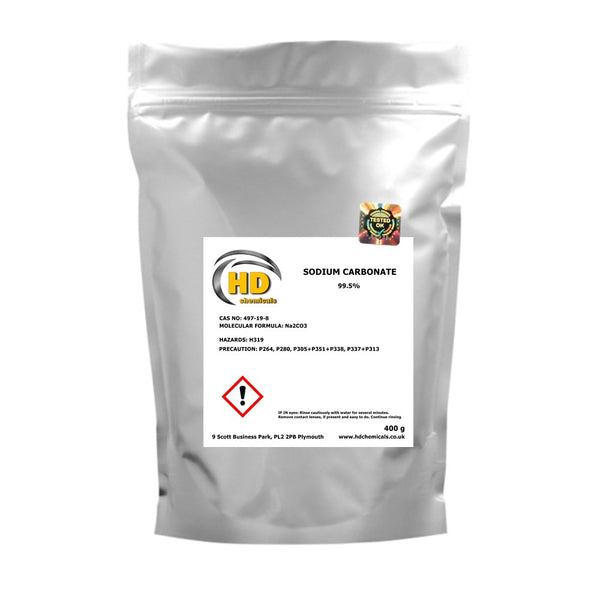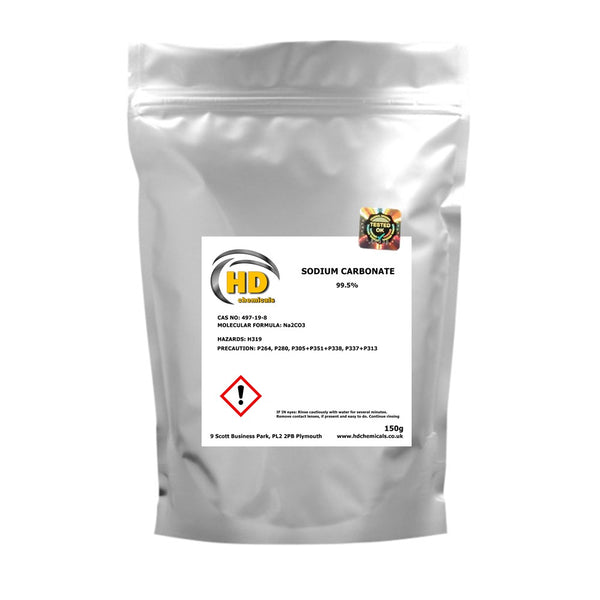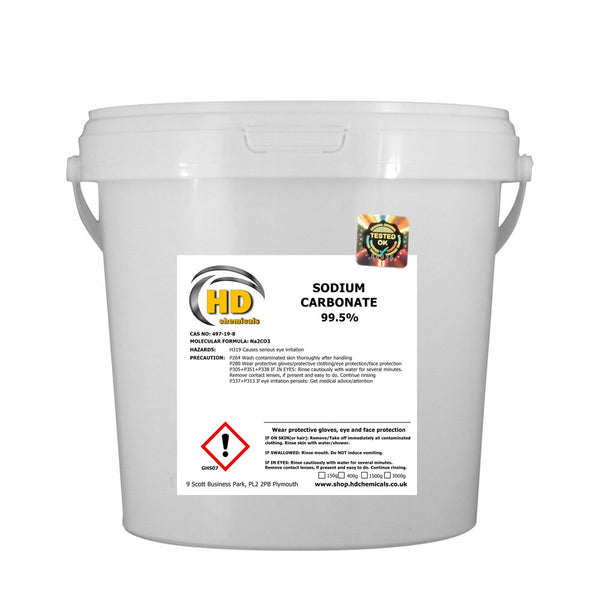Sodium Carbonate 99.5%
Regular price
£6.99
Tax included.
Shipping calculated at checkout.
SODIUM CARBONATE 99.5%
Molecular formula: Na2CO3
Buy 2 items get 1 at 25% off
(add 3 to the basket)
Sodium carbonate, also known as soda ash, is a white, anhydrous and hygroscopic powder with a purity of > 99 %. There are two forms of sodium carbonate available, light soda and dense soda (granular). Sodium carbonate has a melting point of 851C, it decomposes when heated and therefore a boiling point can not be determined. Sodium carbonate is an inorganic salt and therefore the vapour pressure can be considered negligible. It is soluble in water and solubility increases with temperature. The average particle size diameter (d50) of light sodium carbonate is in the range of 90 to 150 µm and of dense sodium carbonate is in the range of 250 to 500 µm. Sodium carbonate is a strong alkaline compound. The pKa of CO3 2- is 10.33, which means that at a pH of 10.33 both carbonate and bicarbonate are present in equal amounts.
Aquarium pH Regulator:
- Sodium carbonate is also used as a relatively strong base in various settings.
- For example, sodium carbonate is used as a pH regulator to maintain stable alkaline conditions.
Glass Manufacture:
- The manufacture of glass is one of the most important uses of sodium carbonate.
- When combined with silica and calcium carbonate and heated to high temperatures, then cooled rapidly, glass is produced.
- This type of glass is known as soda lime glass.
Water Softener:
- In domestic use, it is used as a water softener during laundry.
- It competes with the magnesium and calcium ions in hard water and prevents them from bonding with the detergent being used.
- Without using washing soda, additional detergent is needed to soak up the magnesium and calcium ions.
- Called washing soda, soda crystals, or sal soda in the detergent section of stores, it effectively removes oil, grease, and alcohol stains.
Chemistry:
- In chemistry, it is often used as an electrolyte.
- This is because electrolytes are usually salt-based, and sodium carbonate acts as a very good conductor in the process of electrolysis.
- In addition, unlike chloride ions, which form chlorine gas, carbonate ions are not corrosive to the anodes.
- It is also used as a primary standard for acid-base titrations because it is solid and air-stable, making it easy to weigh accurately.
Taxidermy:
- In taxidermy, sodium carbonate added to boiling water will remove flesh from the skull or bones of trophies to create the "European skull mount" or for educational display in biological and historical studies.
Descaling:
- Sodium carbonate is also used as a descaling agent in boilers such as those found in coffee pots, espresso machines, etc.
Dyeing:
- In dyeing with fiber-reactive dyes, sodium carbonate (often under a name such as soda ash fixative or soda ash activator) is used to ensure proper chemical bonding of the dye with cellulose (plant) fibers, typically before dyeing (for tie dyes), mixed with the dye (for dye painting), or after dyeing (for immersion dyeing).
Bricklaying:
- Sodium carbonate is used by the brick industry as a wetting agent to reduce the amount of water needed to extrude the clay.
Casting:
- In casting, it is referred to as "bonding agent" and is used to allow wet alginate to adhere to gelled alginate.
Silver Cleaning:
- Sodium carbonate, in a solution with common salt, may be used for cleaning silver.
- In a non-reactive container (glass, plastic or ceramic) aluminium foil and the silver object are immersed in the hot salt solution.
- The elevated pH dissolves the aluminium oxide layer on the foil and enables an electrolytic cell to be established.
- Hydrogen ions produced by this reaction reduce the sulphide ions on the silver restoring silver metal.
- The sulphide can be released as small amounts of hydrogen sulphide.
- Rinsing and gently polishing the silver restores a highly polished condition.
PLEASE NOTE: This product is not for human or animal consumption.
Customer Reviews
Based on 3 reviews
Write a review







